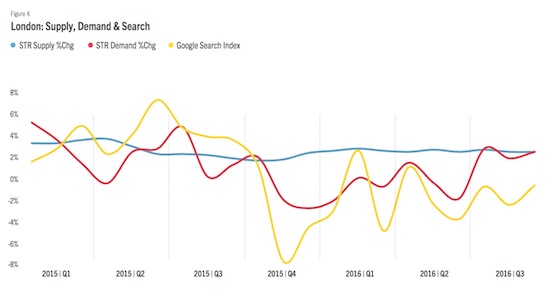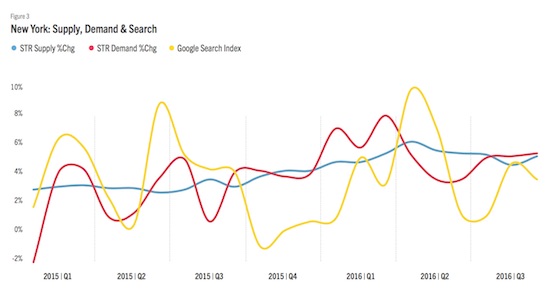
Where search results are helping predict hotel occupancy
By cameron in Uncategorized
A report prepared by benchmark analytics technology company STR and Google shows that tracking hotel search results can be a reliable gauge of hotel bookings.
The report compares Google search, STR demand and bookings trends for hotels in New York and London from 2014 through 2016, and evaluates weekly and monthly hotel performance against Google’s search metrics.
“Based on the data analyzed, we found a positive correlation as well as a statistically significant relationship between Google search data and hotel demand measured by STR for both London and New York. With a confidence interval of 95%, we are able to conclude that higher Google search volumes can be associated with higher STR demand levels.”
While socio-economic factors such as shock events, public policy and currency fluctuations have affected the performance of the two markets involved in the study, and seasonal cycles still play a role in anticipating demand, the report suggests that Google search results can yield beneficial insights to both long and short-term planning and help predict consumer intent.
“By using Google search and STR demand data, hotels can assess interest in a particular destination and see how booking patterns evolve. We see this as a continuous process of monitoring and analyzing search and demand data.
“Combining performance benchmarking data provided by STR with search intelligence from Google offers detailed insights, enabling accommodation providers to make smart, data-driven decisions based on trends of consumer need and interest.”
Google argues it can help hotels make the most of “micro moments” in the travel booking process, specifically the “time-to-make a plan moment,” when brands need to ensure that they are visible to consumers with its Hotel Ads product, and the “let’s-book-it-moment”.
For the “let’s-book-it-moment” Google reports that 46% of travellers with smartphones say they make their booking decision on mobile devices, though they book later on a desktop or laptop.
Google aims to streamline this by simplifying the mobile checkout experience of Book on Google, thereby capturing the consumer impulse to book while it is fresh. 

[Click on charts for a larger version]
![]()

